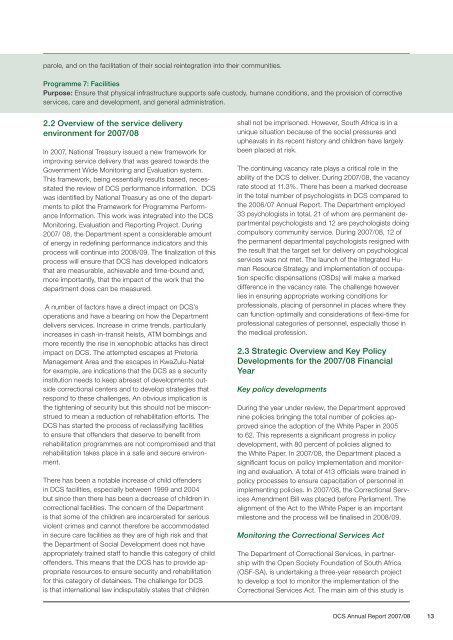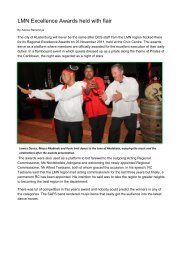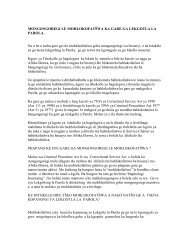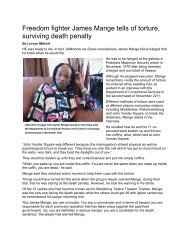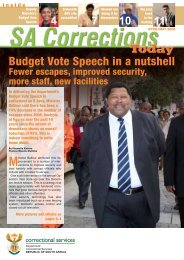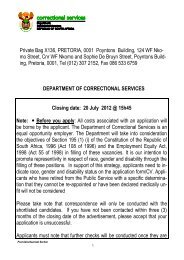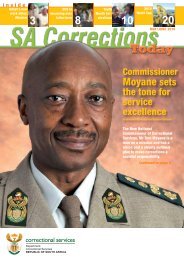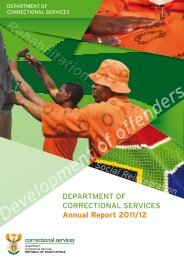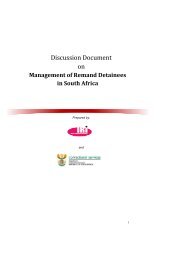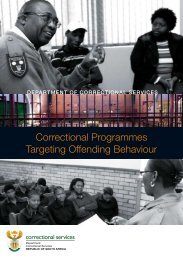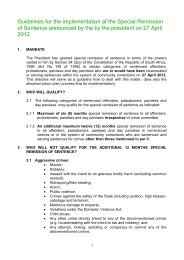As part of our commitment to rehabilitation of offenders, the ...
As part of our commitment to rehabilitation of offenders, the ...
As part of our commitment to rehabilitation of offenders, the ...
Create successful ePaper yourself
Turn your PDF publications into a flip-book with our unique Google optimized e-Paper software.
parole, and on <strong>the</strong> facilitation <strong>of</strong> <strong>the</strong>ir social reintegration in<strong>to</strong> <strong>the</strong>ir communities.<br />
Programme 7: Facilities<br />
Purpose: Ensure that physical infrastructure supports safe cus<strong>to</strong>dy, humane conditions, and <strong>the</strong> provision <strong>of</strong> corrective<br />
services, care and development, and general administration.<br />
2.2 Overview <strong>of</strong> <strong>the</strong> service delivery<br />
environment for 2007/08<br />
In 2007, National Treasury issued a new framework for<br />
improving service delivery that was geared <strong>to</strong>wards <strong>the</strong><br />
Government Wide Moni<strong>to</strong>ring and Evaluation system.<br />
This framework, being essentially results based, necessitated<br />
<strong>the</strong> review <strong>of</strong> DCS performance information. DCS<br />
was identified by National Treasury as one <strong>of</strong> <strong>the</strong> de<strong>part</strong>ments<br />
<strong>to</strong> pilot <strong>the</strong> Framework for Programme Performance<br />
Information. This work was integrated in<strong>to</strong> <strong>the</strong> DCS<br />
Moni<strong>to</strong>ring, Evaluation and Reporting Project. During<br />
2007/ 08, <strong>the</strong> De<strong>part</strong>ment spent a considerable amount<br />
<strong>of</strong> energy in redefining performance indica<strong>to</strong>rs and this<br />
process will continue in<strong>to</strong> 2008/09. The finalization <strong>of</strong> this<br />
process will ensure that DCS has developed indica<strong>to</strong>rs<br />
that are measurable, achievable and time-bound and,<br />
more importantly, that <strong>the</strong> impact <strong>of</strong> <strong>the</strong> work that <strong>the</strong><br />
de<strong>part</strong>ment does can be measured.<br />
A number <strong>of</strong> fac<strong>to</strong>rs have a direct impact on DCS’s<br />
operations and have a bearing on how <strong>the</strong> De<strong>part</strong>ment<br />
delivers services. Increase in crime trends, <strong>part</strong>icularly<br />
increases in cash-in-transit heists, ATM bombings and<br />
more recently <strong>the</strong> rise in xenophobic attacks has direct<br />
impact on DCS. The attempted escapes at Pre<strong>to</strong>ria<br />
Management Area and <strong>the</strong> escapes in KwaZulu-Natal<br />
for example, are indications that <strong>the</strong> DCS as a security<br />
institution needs <strong>to</strong> keep abreast <strong>of</strong> developments outside<br />
correctional centers and <strong>to</strong> develop strategies that<br />
respond <strong>to</strong> <strong>the</strong>se challenges. An obvious implication is<br />
<strong>the</strong> tightening <strong>of</strong> security but this should not be misconstrued<br />
<strong>to</strong> mean a reduction <strong>of</strong> <strong>rehabilitation</strong> efforts. The<br />
DCS has started <strong>the</strong> process <strong>of</strong> reclassifying facilities<br />
<strong>to</strong> ensure that <strong>of</strong>fenders that deserve <strong>to</strong> benefit from<br />
<strong>rehabilitation</strong> programmes are not compromised and that<br />
<strong>rehabilitation</strong> takes place in a safe and secure environment.<br />
There has been a notable increase <strong>of</strong> child <strong>of</strong>fenders<br />
in DCS facilities, especially between 1999 and 2004<br />
but since <strong>the</strong>n <strong>the</strong>re has been a decrease <strong>of</strong> children in<br />
correctional facilities. The concern <strong>of</strong> <strong>the</strong> De<strong>part</strong>ment<br />
is that some <strong>of</strong> <strong>the</strong> children are incarcerated for serious<br />
violent crimes and cannot <strong>the</strong>refore be accommodated<br />
in secure care facilities as <strong>the</strong>y are <strong>of</strong> high risk and that<br />
<strong>the</strong> De<strong>part</strong>ment <strong>of</strong> Social Development does not have<br />
appropriately trained staff <strong>to</strong> handle this category <strong>of</strong> child<br />
<strong>of</strong>fenders. This means that <strong>the</strong> DCS has <strong>to</strong> provide appropriate<br />
res<strong>our</strong>ces <strong>to</strong> ensure security and <strong>rehabilitation</strong><br />
for this category <strong>of</strong> detainees. The challenge for DCS<br />
is that international law indisputably states that children<br />
shall not be imprisoned. However, South Africa is in a<br />
unique situation because <strong>of</strong> <strong>the</strong> social pressures and<br />
upheavals in its recent his<strong>to</strong>ry and children have largely<br />
been placed at risk.<br />
The continuing vacancy rate plays a critical role in <strong>the</strong><br />
ability <strong>of</strong> <strong>the</strong> DCS <strong>to</strong> deliver. During 2007/08, <strong>the</strong> vacancy<br />
rate s<strong>to</strong>od at 11.3%. There has been a marked decrease<br />
in <strong>the</strong> <strong>to</strong>tal number <strong>of</strong> psychologists in DCS compared <strong>to</strong><br />
<strong>the</strong> 2006/07 Annual Report. The De<strong>part</strong>ment employed<br />
33 psychologists in <strong>to</strong>tal, 21 <strong>of</strong> whom are permanent de<strong>part</strong>mental<br />
psychologists and 12 are psychologists doing<br />
compulsory community service. During 2007/08, 12 <strong>of</strong><br />
<strong>the</strong> permanent de<strong>part</strong>mental psychologists resigned with<br />
<strong>the</strong> result that <strong>the</strong> target set for delivery on psychological<br />
services was not met. The launch <strong>of</strong> <strong>the</strong> Integrated Human<br />
Res<strong>our</strong>ce Strategy and implementation <strong>of</strong> occupation<br />
specific dispensations (OSDs) will make a marked<br />
difference in <strong>the</strong> vacancy rate. The challenge however<br />
lies in ensuring appropriate working conditions for<br />
pr<strong>of</strong>essionals, placing <strong>of</strong> personnel in places where <strong>the</strong>y<br />
can function optimally and considerations <strong>of</strong> flexi-time for<br />
pr<strong>of</strong>essional categories <strong>of</strong> personnel, especially those in<br />
<strong>the</strong> medical pr<strong>of</strong>ession.<br />
2.3 Strategic Overview and Key Policy<br />
Developments for <strong>the</strong> 2007/08 Financial<br />
Year<br />
Key policy developments<br />
During <strong>the</strong> year under review, <strong>the</strong> De<strong>part</strong>ment approved<br />
nine policies bringing <strong>the</strong> <strong>to</strong>tal number <strong>of</strong> policies approved<br />
since <strong>the</strong> adoption <strong>of</strong> <strong>the</strong> White Paper in 2005<br />
<strong>to</strong> 62. This represents a significant progress in policy<br />
development, with 80 percent <strong>of</strong> policies aligned <strong>to</strong><br />
<strong>the</strong> White Paper. In 2007/08, <strong>the</strong> De<strong>part</strong>ment placed a<br />
significant focus on policy implementation and moni<strong>to</strong>ring<br />
and evaluation. A <strong>to</strong>tal <strong>of</strong> 413 <strong>of</strong>ficials were trained in<br />
policy processes <strong>to</strong> ensure capacitation <strong>of</strong> personnel in<br />
implementing policies. In 2007/08, <strong>the</strong> Correctional Services<br />
Amendment Bill was placed before Parliament. The<br />
alignment <strong>of</strong> <strong>the</strong> Act <strong>to</strong> <strong>the</strong> White Paper is an important<br />
miles<strong>to</strong>ne and <strong>the</strong> process will be finalised in 2008/09.<br />
Moni<strong>to</strong>ring <strong>the</strong> Correctional Services Act<br />
The De<strong>part</strong>ment <strong>of</strong> Correctional Services, in <strong>part</strong>nership<br />
with <strong>the</strong> Open Society Foundation <strong>of</strong> South Africa<br />
(OSF-SA), is undertaking a three-year research project<br />
<strong>to</strong> develop a <strong>to</strong>ol <strong>to</strong> moni<strong>to</strong>r <strong>the</strong> implementation <strong>of</strong> <strong>the</strong><br />
Correctional Services Act. The main aim <strong>of</strong> this study is<br />
DCS Annual Report 2007/08 13


